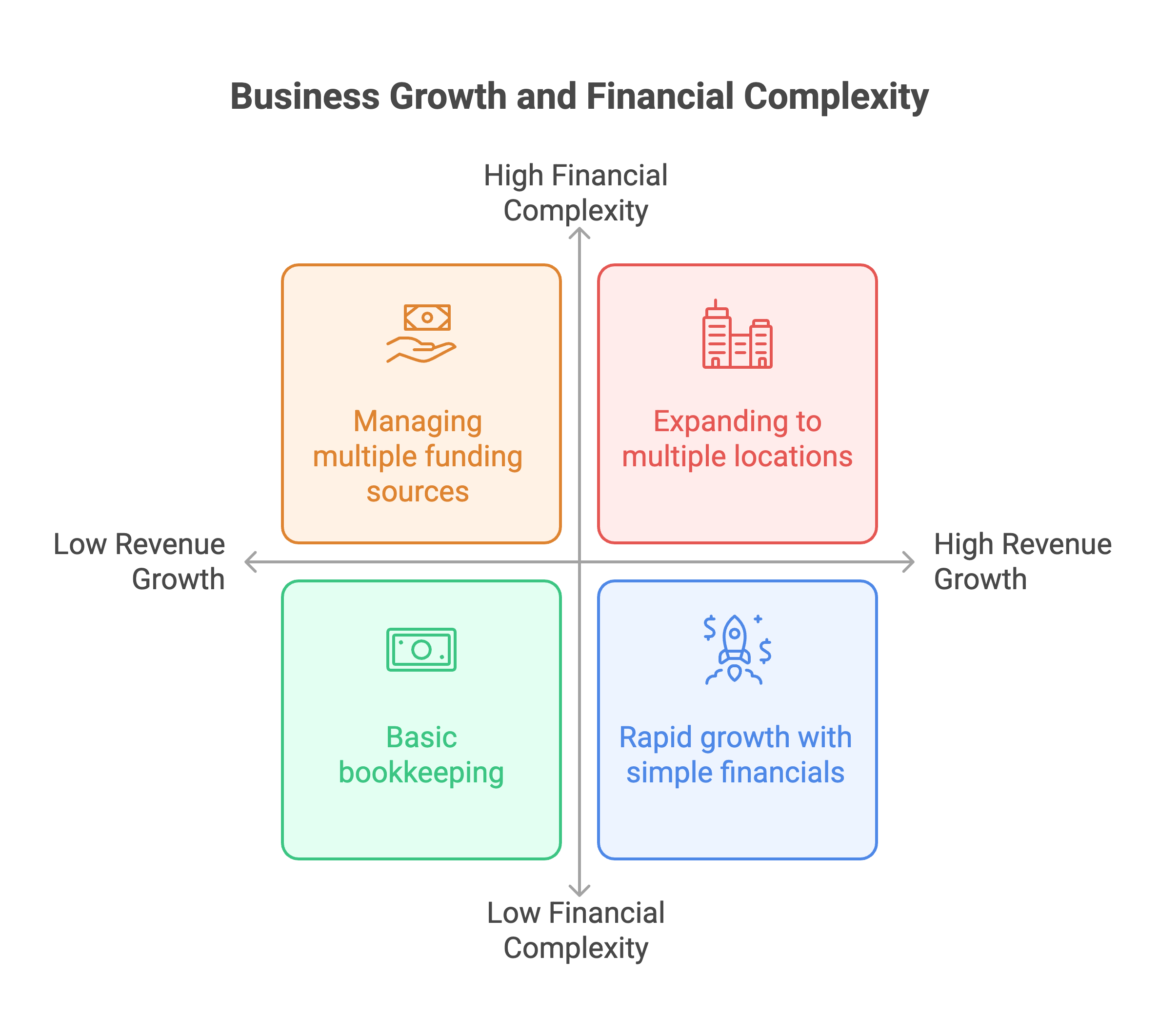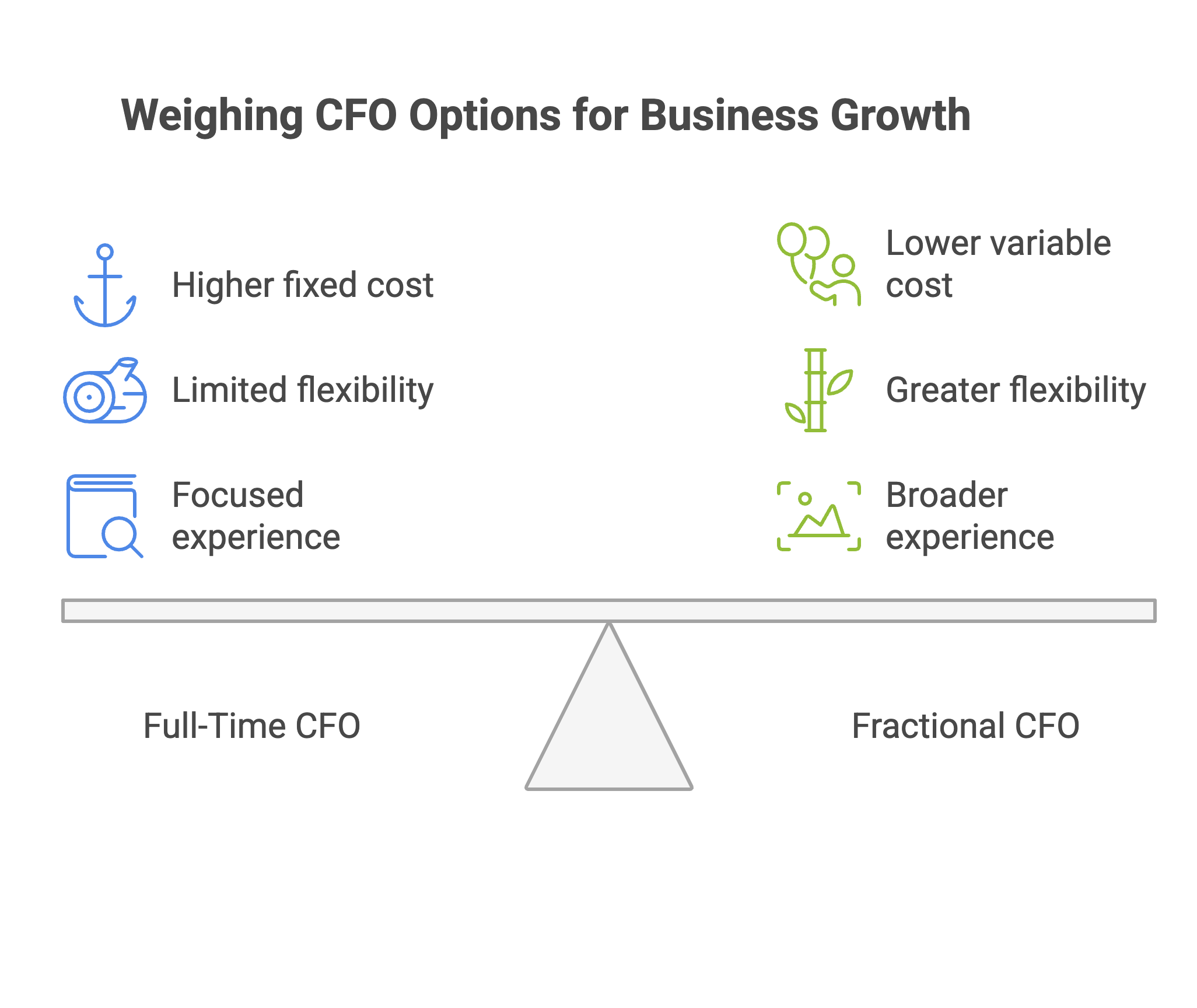You've been running your business for a while now, and things are getting complicated. The spreadsheets that used to work fine are becoming unwieldy. Your accountant handles the basics, but you need someone who can think strategically about your financial future. Sound familiar?
This is exactly when many business owners start wondering if they need higher-level financial expertise. But here's the thing - you might not be ready for a full-time CFO yet, and that's perfectly normal.
The question isn't whether you need financial leadership. The real question is what type of CFO support makes sense for your business right now. A fractional CFO might be exactly what you're looking for, giving you access to senior-level expertise without the commitment or cost of a full-time hire.
Let's walk through the key indicators that signal it's time to bring in professional financial leadership.

Most businesses start thinking about advanced financial leadership when they hit certain revenue milestones. If you're approaching or have crossed the $1 million mark, your financial operations are likely becoming more complex than one person can handle effectively.
At this stage, you're probably dealing with multiple revenue streams, more sophisticated cash flow patterns, and stakeholders who want detailed financial reporting. Your startup days of managing everything in QuickBooks are behind you.
Fast growth is exciting, but it also creates financial challenges that can catch you off guard. When your revenue is growing by 50% or more year-over-year, you need someone who can help you scale your financial operations accordingly.
A fractional cfo can help you build the financial infrastructure needed to support growth without the overhead of a full-time executive. They understand how to create systems that scale with your business.
If you're expanding to multiple locations or operating different business units, your financial complexity increases exponentially. Each location might have different cost structures, and you need consolidated reporting that gives you a clear picture of overall performance.
This is where fractional CFO services really shine. They can implement systems that give you visibility across all aspects of the business while helping each unit understand their financial performance.
Many businesses experience seasonal variations that make cash flow planning challenging. If you find yourself constantly worried about whether you'll have enough cash to cover expenses during slow periods, it's time to hire a fractional CFO who can create reliable forecast models.
Professional financial planning goes beyond looking at last year's numbers. A good fractional cfo helps you understand the drivers of your cash flow and develop strategies to smooth out seasonal fluctuations.
Whether you're dealing with investors, loans, or considering raising capital, managing multiple funding sources requires sophisticated financial expertise. Each funding source comes with different reporting requirements and restrictions.
A fractional CFO can help you navigate these complexities while ensuring you maintain good relationships with all your financial partners. They know what investors want to see and can help you prepare the financial statements and projections that support your funding goals.
As your business grows, managing working capital becomes increasingly important. You need someone who can optimize your accounts receivable, manage inventory levels, and negotiate payment terms that improve your cash flow position.
This type of strategic financial management requires experience that most business owners simply don't have. A fractional CFO brings this expertise without requiring you to hire a full-time employee.
If you find yourself making important business decisions without solid financial analysis, you're flying blind. Whether you're considering new product lines, evaluating acquisition opportunities, or planning major investments, you need financial expertise to support these decisions.
The cost of making the wrong strategic decision can be enormous. Bringing in a fractional cfo to provide analysis and recommendations is often far less expensive than the potential cost of a bad decision.
Once you have outside investors or a formal board of directors, your financial reporting needs become much more sophisticated. These stakeholders expect professional-quality financial presentations and strategic insights.
A fractional CFO can handle board presentations, investor updates, and the detailed financial analysis that sophisticated stakeholders require. They become your strategic partner in managing these critical relationships.
If you're required to have annual audits or are considering going public eventually, you need someone who understands these processes. Audit preparation requires specific expertise and significant time investment.
Fractional cfos often have extensive experience working with auditors and can help ensure your financial records and processes meet professional standards. This preparation pays dividends when you actually need to go through the audit process.
As your business grows, you'll likely need to build a finance team. But hiring and managing financial professionals requires expertise that most business owners don't possess.
A fractional CFO can help you determine what positions you need, assist with hiring decisions, and provide leadership for your growing finance team. They become a bridge between where you are now and where you need to be.
Modern businesses require sophisticated financial systems and processes. If you're still managing everything manually or using basic software that doesn't integrate well, you're limiting your growth potential.
The right fractional cfo services include helping you select and implement systems that will support your business as it scales. They know what works and what doesn't, saving you from expensive mistakes.
Once you have multiple employees or departments, you need systems to measure and manage performance. This includes budgeting, variance analysis, and key performance indicators that help you run your business more effectively.
Creating these systems requires both technical expertise and business understanding. A fractional CFO can establish performance management processes that align with your business goals.

The most obvious consideration is cost. A full-time CFO typically costs $150,000-$300,000+ in salary and benefits, plus equity in many cases. Fractional cfo services typically cost a fraction of that while providing similar expertise.
But cost isn't the only consideration. You also need to think about whether you have enough work to keep a full-time CFO busy and engaged. Many growing businesses find that fractional support provides exactly the right level of involvement.
Your business needs will change as you grow. A fractional cfo arrangement gives you flexibility to adjust the level of support as your needs evolve. You can increase involvement during busy periods or scale back during slower times.
This flexibility is particularly valuable for businesses with seasonal fluctuations or those going through periods of rapid change. You get the expertise you need without being locked into a fixed cost structure.
Fractional cfos typically work with multiple clients, which means they bring broader experience than someone who has only worked in similar businesses. This outside perspective can be incredibly valuable when you're facing new challenges.
They've likely seen similar situations before and can help you avoid common pitfalls while identifying opportunities you might have missed.
Take a hard look at your current financial management capabilities. Are you confident in your financial reporting? Do you have reliable forecasts? Can you quickly access the financial information you need to make decisions?
If the answer to any of these questions is no, it's probably time to consider bringing in professional help. The key is being honest about your current capabilities and future needs.
Consider where your business is heading over the next 12-24 months. If you're planning significant growth, new product launches, or geographic expansion, you'll need more sophisticated financial support.
The time to bring in a fractional CFO is before you desperately need one, not after you're already struggling with financial complexity.
Think about how you currently spend your time as a business owner. If you're spending significant time on financial tasks that someone else could handle better, you're not maximizing your impact on the business.
A good fractional cfo frees up your time to focus on the aspects of the business where you add the most value. This time savings alone often justifies the investment.
Q: At what revenue level should I consider hiring a fractional CFO?
A: Most businesses benefit from fractional CFO services when they reach $1-3 million in annual revenue, though startups with complex financial needs or growth plans may benefit earlier.
Q: How is working with a fractional CFO different from hiring a full-time CFO?
A: A fractional CFO typically works part-time or on a project basis, providing strategic financial leadership at a fraction of the cost. They bring experience from multiple businesses while focusing on your specific needs.
Q: What's the typical time commitment for a fractional CFO arrangement?
A: This varies based on your business needs, but most arrangements involve 10-40 hours per month. The commitment can be adjusted as your business grows and your needs change.
Q: Can a fractional CFO help with raising capital or preparing for acquisition?
A: Absolutely. Many fractional CFOs have extensive experience with fundraising, due diligence, and acquisition processes. They can help prepare your financials and guide you through these complex transactions.
Q: How do I know if my business is ready for a fractional CFO versus needing a full-time hire?
A: Consider a fractional CFO if you need strategic financial leadership but don't have enough work to keep a full-time CFO busy, or if you want to test the waters before making a full-time commitment.
Q: What should I expect to pay for fractional CFO services?
A: Costs typically range from $3,000-$10,000 per month depending on the scope of work and level of involvement. This represents significant savings compared to a full-time hire while providing similar expertise.
Q: How long do most fractional CFO arrangements last?
A: Some businesses use fractional services for specific projects (6-12 months), while others maintain ongoing relationships for years. The arrangement should evolve based on your changing business needs.
Q: Can a fractional CFO work with my existing accounting team?
A: Yes, a good fractional CFO complements your existing team by providing senior-level oversight and strategic guidance. They often help develop your team's capabilities while handling higher-level responsibilities.

A practical comparison of hiring a freelancer vs using a dedicated offshore accounting team, focusing on continuity, quality control, security, and scaling.

How CPA firms outsource payroll and 1099 work to reduce penalties and admin load, with a clean workflow for approvals, filings, and year-end reporting.

Practical do's and don'ts for CPA firms outsourcing accounting work, based on common failure points and what successful rollouts do differently.